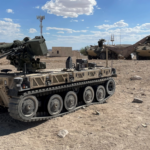
The Army has moved $800 million from its operations and military personnel accounts so far this fiscal year to support the surge of European and Central Command requirements that would otherwise be covered by the pending supplemental, with the service’s no. 2 civilian leader on Wednesday citing passage of the foreign aid bill as “absolutely crucial.” “The need to pass the supplemental is absolutely crucial [and] not just because we’re supporting Ukraine, and it’s absolutely vital that we support Ukraine…

 By
By 











